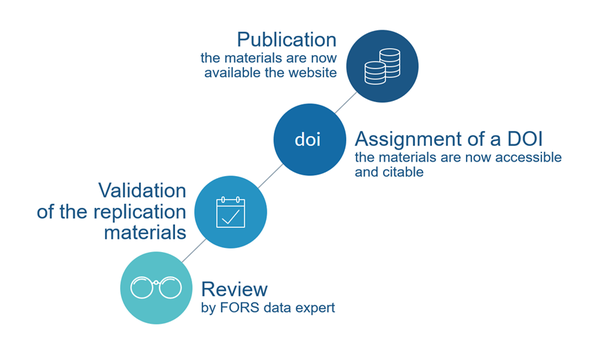6.5.1 FORS and the introduction of replication services (Switzerland)
Context
Given the current movement across Europe towards open science, open data, and research transparency, archival services are becoming increasingly important in the Swiss research landscape. FORS maintains the national archive for social science data in Switzerland and runs an online platform for the preservation and dissemination of research data, SWISSUbase (formerly known as FORSbase). The platform has been developed to process research data from a reuse perspective, ensuring the collection of rich metadata and requiring access control (at a minimum registration to the system). Recently, growing demands for easy deposit of replication materials, such as syntaxes and documentation files, have pinpointed some shortcomings of the system, which remains far too complex for such types of data. Indeed, reuse and replication require distinct materials, metadata, workflows, and access conditions.
The adaptation of SWISSUbase to include easy deposit of and access to replication files requires some major developments. To be able to respond rapidly to the demands of the research community, FORS devised an in-house, temporary, and separate web-based solution for the handling of replication materials. Key conditions for its development included a fully open access solution, simple to program, implement, and use, as well the possibility for future integration into SWISSUbase.
A new service
Known as the FORS replication service, the web-based solution is free and allows Swiss-based journals and researchers to share and disseminate replication materials, which consist of all materials needed to reproduce analyses underlying a scientific publication. This includes links to the full datasets, analysis codes/syntaxes used, reports, read me files, or any other useful documents to reproduce research results. Partial datasets may also be deposited, but full datasets must be deposited in appropriate platforms such as SWISSUbase.
Simplicity of use
The tool has been designed to be easy to use, both for the researchers who deposit their materials, the FORS data experts who process them, and the users who access them.
To deposit replication materials linked to a publication and receive a DOI, researchers need to follow four steps: 1) download the replication form, 2) complete the metadata, 3) choose a licence (CC BY or CC BY NC ND) and 4) return the completed deposit form as well as well as the replication materials to FORS.

Once the form and the replication materials have been submitted by the researcher, a FORS data expert will review them and make sure they are complete, and that the procedure for reproducing the analyses is understandable.
After validation of the replication materials by a FORS data expert, the materials are published on the website on the date the depositor has chosen, and a DOI is assigned to the materials. On request, a DOI can also be provided before the materials are published.

Finally, to access data, users simply need to select an entry which contains replication materials and click on the download form. They will then receive a .zip file containing the materials, a read-me file explaining how to handle the files, as well as information relating to the user licence.
Next steps and further developments
This web-based solution, which has been implemented during spring 2022, allows FORS to assess the needs of researchers, journals and funders. Further development includes a pilot project with several Swiss-based journals, the results of which will allow FORS to further develop their web-based solution that can be integrated into SWISSUbase in order to offer an “all in one” solution. Additional features could include a peer-review process, versioning, data citation, as well as a pre-registration service.
Apart from their own services, FORS also develops guides on reproducible research that can serve the wider research community, such as their guide on pre-registration and registered reports as well as a guide on replication in the social sciences.